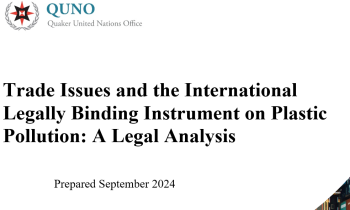New Brief: "Trade Issues and the International Legally Binding Instrument on Plastic Pollution: A Legal Analysis"

As part of QUNO’s Sustainable and Just Economic Systems programme and the Uncommon Collaborations initiative, we are pleased to announce the release of a new brief titled Trade Issues and the International Legally Binding Instrument on Plastic Pollution: A Legal Analysis. Authored by Dr. Alexandra Harrington, the report provides a critical examination of the intersection between international trade law and the proposed global treaty to end plastic pollution (ILBI), currently under negotiation.
This analysis addresses key concerns raised in the ILBI negotiations regarding potential conflicts with existing World Trade Organization (WTO) agreements. It delves into the legal complexities surrounding subsidies, import and export licensing, and compliance provisions as outlined in the ILBI’s draft text, known as the Compilation Document. The analysis emphasizes that the ILBI’s proposals to limit, phase out, or ban subsidies related to plastic production would not conflict with WTO agreements, nor would its import or export provisions, labelling, and product design measures.
This work fills an important gap in the ongoing Intergovernmental Negotiating Committee (INC) discussions by highlighting areas of potential convergence between the ILBI and the WTO's trade frameworks. It also draws parallels with the successful coexistence of other multilateral environmental agreements (MEAs), such as the Basel, Rotterdam, and Stockholm Conventions, within the WTO system.
The analysis serves as a timely resource for INC delegates, policymakers, and stakeholders engaged in shaping the global treaty to address plastic pollution. It offers a path forward for harmonizing environmental objectives with global trade commitments, and will inform discussions at the upcoming INC-5 negotiations in Busan, Republic of Korea.
This initiative is supported by Dalberg Catalyst through grant funding from The Rockefeller Foundation. The findings and conclusions contained within are those of the authors and do not necessarily reflect positions or policies of The Rockefeller Foundation or Dalberg Catalyst.


